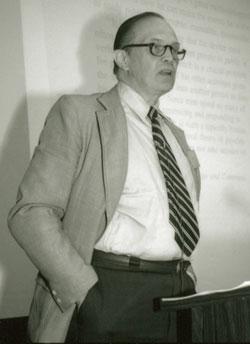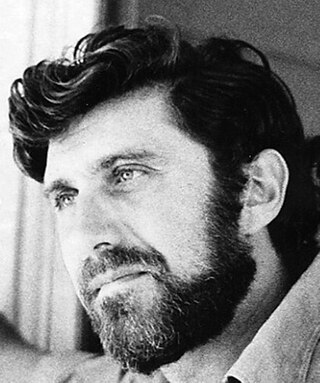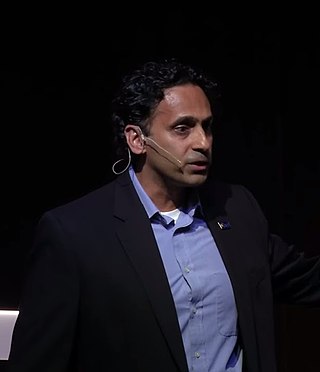Related Research Articles

Psychology is the scientific study of mind and behavior. Psychology includes the study of conscious and unconscious phenomena, including feelings and thoughts. It is an academic discipline of immense scope, crossing the boundaries between the natural and social sciences. Psychologists seek an understanding of the emergent properties of brains, linking the discipline to neuroscience. As social scientists, psychologists aim to understand the behavior of individuals and groups. Ψ (psi), the first letter of the Greek word psyche from which the term psychology is derived, is commonly associated with the science.

George Armitage Miller was an American psychologist who was one of the founders of cognitive psychology, and more broadly, of cognitive science. He also contributed to the birth of psycholinguistics. Miller wrote several books and directed the development of WordNet, an online word-linkage database usable by computer programs. He authored the paper, "The Magical Number Seven, Plus or Minus Two," in which he observed that many different experimental findings considered together reveal the presence of an average limit of seven for human short-term memory capacity. This paper is frequently cited by psychologists and in the wider culture. Miller won numerous awards, including the National Medal of Science.

Elliot Aronson is an American psychologist who has carried out experiments on the theory of cognitive dissonance, and invented the Jigsaw Classroom, a cooperative teaching technique which facilitates learning while reducing interethnic hostility and prejudice. In his 1972 social psychology textbook, The Social Animal, he stated Aronson's First Law: "People who do crazy things are not necessarily crazy," thus asserting the importance of situational factors in bizarre behavior. He is the only person in the 120-year history of the American Psychological Association to have won all three of its major awards: for writing, for teaching, and for research. In 2007 he received the William James Award for Lifetime Achievement from the Association for Psychological Science, in which he was cited as the scientist who "fundamentally changed the way we look at everyday life.” A Review of General Psychology survey, published in 2002, ranked Aronson as the 78th most cited psychologist of the 20th century. He officially retired in 1994 but continues to teach and write.

Quantitative psychology is a field of scientific study that focuses on the mathematical modeling, research design and methodology, and statistical analysis of psychological processes. It includes tests and other devices for measuring cognitive abilities. Quantitative psychologists develop and analyze a wide variety of research methods, including those of psychometrics, a field concerned with the theory and technique of psychological measurement.

Richard Eugene Nisbett is an American social psychologist and writer. He is the Theodore M. Newcomb Distinguished Professor of social psychology and co-director of the Culture and Cognition program at the University of Michigan at Ann Arbor. Nisbett's research interests are in social cognition, culture, social class, and aging. He received his Ph.D. from Columbia University, where his advisor was Stanley Schachter, whose other students at that time included Lee Ross and Judith Rodin.

Michael I. Posner is an American psychologist who is a researcher in the field of attention, and the editor of numerous cognitive and neuroscience compilations. He is emeritus professor of psychology at the University of Oregon, and an adjunct professor at the Weill Medical College in New York. A Review of General Psychology survey, published in 2002, ranked Posner as the 56th most cited psychologist of the 20th century.
Lisa Feldman Barrett is a distinguished professor of psychology at Northeastern University, where she focuses on affective science. She is a director of the Interdisciplinary Affective Science Laboratory. Along with James Russell, she is the founding editor-in-chief of the journal Emotion Review. Along with James Gross, she founded the Society for Affective Science.

Robert Allen Bjork is Distinguished Professor of Psychology at the University of California, Los Angeles. His research focuses on human learning and memory and on the implications of the science of learning for instruction and training. He is the creator of the directed forgetting paradigm. He was elected a member of the National Academy of Sciences in 2022.

Mahzarin Rustum Banaji FBA is an American psychologist of Indian origin at Harvard University, known for her work popularizing the concept of implicit bias in regard to race, gender, sexual orientation, and other factors.
Susan Tufts Fiske is the Eugene Higgins Professor of Psychology and Public Affairs in the Department of Psychology at Princeton University. She is a social psychologist known for her work on social cognition, stereotypes, and prejudice. Fiske leads the Intergroup Relations, Social Cognition, and Social Neuroscience Lab at Princeton University. Her theoretical contributions include the development of the stereotype content model, ambivalent sexism theory, power as control theory, and the continuum model of impression formation.
The Journal of Abnormal Psychology is a peer-reviewed academic journal published by the American Psychological Association (APA). The journal has been in publication for over 110 years, and it is considered to be a "preeminent outlet for research in psychopathology". Beginning in 2022, the journal will be known as the Journal of Psychopathology and Clinical Science.
William Kaye Estes was an American psychologist. A Review of General Psychology survey, published in 2002, ranked Estes as the 77th most cited psychologist of the 20th century. In order to develop a statistical explanation for the learning phenomena, William Kaye Estes developed the Stimulus Sampling Theory in 1950 which suggested that a stimulus-response association is learned on a single trial; however, the learning process is continuous and consists of the accumulation of distinct stimulus-response pairings.

Nancy L. Segal is an American evolutionary psychologist and behavioral geneticist, specializing in the study of twins. She is the Professor of Developmental Psychology and Director of the Twin Studies Center, at California State University, Fullerton. Segal was a recipient of the 2005 James Shields Award for Lifetime Contributions to Twin Research from the Behavior Genetics Association and International Society for Twin Studies.
Ellen S. Berscheid is an American social psychologist who is currently a Regents professor at the University of Minnesota, where she earlier had earned her PhD in 1965. Berscheid conducted research on interpersonal relationships, emotions and moods, and social cognition. Berscheid wrote books, articles and other publications to contribute to the field of Social Psychology. She was involved in controversy surrounding the funding for her research on why people fall in love. In addition to her position at the University of Minnesota as a Psychology and Business professor; she has also held a position at Pillsbury. She has received awards for her contributions to social psychology, including The Presidential Citation and the Distinguished Scientific Contribution Award from the American Psychological Association.
Steve Penrod is a distinguished professor of psychology at the John Jay College of Criminal Justice. His education and career have led him to become an expert in the areas of psychology and law. He has contributed heavily to the field of psychology in the area of eyewitness memory, specifically the accuracy of eyewitness identification.
Darcia Narvaez is a Professor of Psychology Emerita at the University of Notre Dame who has written extensively on issues of character, moral development, and human flourishing.
Wilbert James "Bill" McKeachie was an American psychologist. He served as president of the American Psychological Association, the American Psychological Foundation and the American Association of Higher Education. He was a longtime faculty member at the University of Michigan and the initial author of McKeachie's Teaching Tips: Strategies, Research, and Theory for College and University Teachers, a widely read book on college teaching that was first published in 1951 and more recently in its 14th edition in 2013.

Kay Deaux is an American social psychologist known for her pioneering research on immigration and feminist identity. Deaux is Distinguished Professor Emerita at the Department of Psychology at the Graduate Center of the City University of New York (CUNY). According to Brenda Major, Deaux's work centers on the question of how social categories affect one's psychological makeup, social behavior, and life outcomes, while emphasizing the subjectivity of people's identities and experiences and the larger social context.
John Edward Anderson (1893–1966) was an American psychologist. He was the 52nd president of the American Psychological Association (APA) in 1943, and editor of Psychological Bulletin from 1942 to 1946. He also made significant contributions to the field of child psychology.

Regan A. R. Gurung is an American psychologist and award-winning author.
References
- ↑ "Eugene Borgida". Social Psychology Network. Retrieved January 22, 2019.
- ↑ "Eugene Borgida". University of Minnesota School of Law. Retrieved 22 January 2019.